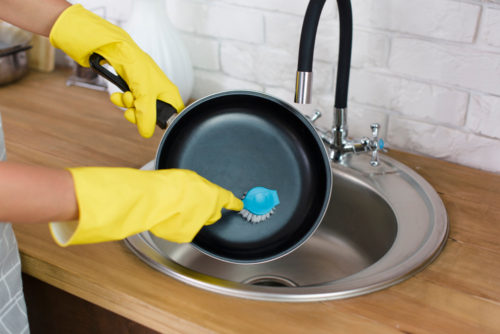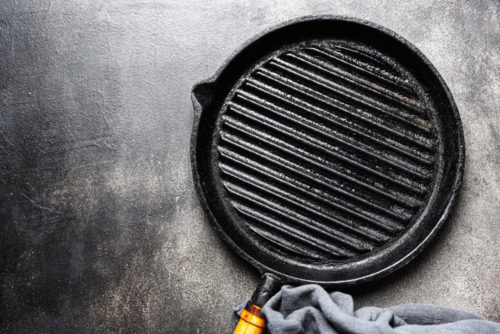It isn’t that hard, but sometimes life gets us a tough time. Maintenance and cleaning of cast iron skillets usually don’t require too much, but if you leave your skillet soaked in water for long hours or do not clean it correctly, there are chances of rust development over time.
Why Does Cast Iron Rust?
Cast iron cookware is made by mixing iron, steel, and alloys, creating a bumpy, porous surface. Seasoning with any edible oil is necessary to build a protective layer that covers these bumps and creates a smooth non-stick finished surface. If we skip this seasoning step with oils, there are chances of rust. Apart from seasoning, another primary reason for rusting is leaving your cast iron skillets unattended in the water or placing them in some moisture-prone area where the metal will develop iron.
But there is always a solution to unfavorable situations in life. So don’t panic or think to throw away your cast iron skillets if it gets a little or a lot of rust.
How To Remove Rust From Your Cast Iron Skillet?
There are simple ways to eliminate all the rust and return the seamless non-stick finish.
For this, you’ll need;
- A dishwashing soap
- Sponge or scrubber
- Steel wool
- Any edible vegetable oil


Step 01: Scrub
First, you must crud off all the rust, grease, and seasoning. We’ll do it again later. Use a steel wool scrubber to cleanse your cast iron skillet thoroughly. You need to get your skillet with water, add a little soap and with the help of your scrubber, start stripping away all the rust in circular motions. It would help if you went a little harder at this time to get it away with this all. Continue scrubbing in small circular rounds and focus on the rustiest parts first. Scrub it until you see the original black color is achieved.
Step: 02 Rinse Thoroughly
At this point, you need to rinse your cast iron skillet thoroughly and throw away all the gunk into the sink. Then, scrub it with a soft foamy sponge and soap to double clean and buff off any remaining residues.
Step: 03 Drying
After scrubbing all the rust, you must dry your cast iron skillets properly. Use a paper towel or dish rag to suck all the moisture. For complete drying later, put your cast iron skillet into the oven for about ten minutes to evaporate any water if it is left.
Step 04: Seasoning
So now, when you get your cast iron skillet back to its original base layer. The final step here is to season it before use. You can use any edible vegetable oil. Mostly used are; Sunflower, Canola, flaxseed, and Grapeseed oils. Pour about one tablespoon of oil and spread it nicely with the help of your fingers or paper towel to all the inner, handle, and outer surfaces.
Wipe away any excess oil. Make sure you use the right amount of oil. It should cover the entire skillet surface but not drip. Now set your oven at 350° C and place an aluminum foil and the bottom rack. Place your skillet inside the oven in an upside downward position for about an hour. Turn off the oven and allow the skillet to cool. The oil will expand inside the porous surface of the raw cast iron skillet resulting in a smooth, non-stick finish. You can repeat the process if you feel there is a need.
WOAH! Your rusted cast iron skillet is now new and ready to use.

How To Prevent Cast Iron From Rusting?
Want to prevent having a rusted skillet in the first place? Here are a few tips to help you avoid rusting your cookware.
Never Soak Your Pan: Since cast iron is made of iron and other alloys, it tends to develop rust. Therefore, avoiding soaking your pan for longer times in water is best.
Don’t Let Your Pan Air Dry: Dry your skillets immediately after washing them with a paper towel or use an oven to absorb any left moisture.
Oiling After Use: It is recommended to lightly oil the base of your skillets after use and doesn’t leave it completely dry.
Avoid Acidic Foods: Acidic foods like vinegar and tomatoes can develop rust by eating up the seasoning, so it is best to use them with a fully seasoned skillet.
Use Often: Don’t let your cast iron be on your kitchen shelves without being used. Less air circulation will develop the chances of rusting.
Culina cast iron accessories to include all the necessary products that you will need to clean and season your cast iron skillets for their best efficacy and use. Culina soap, seasoning stick, and scrubber are all you need. They are made with 100% natural ingredients to restore and cleanse your skillets thoroughly to give you a lifetime of service and experience.
Disclosure: This post contains affiliate links. As an Amazon Associate I earn from qualifying purchases, but there will be no extra charges to you. Thank you for your support!

